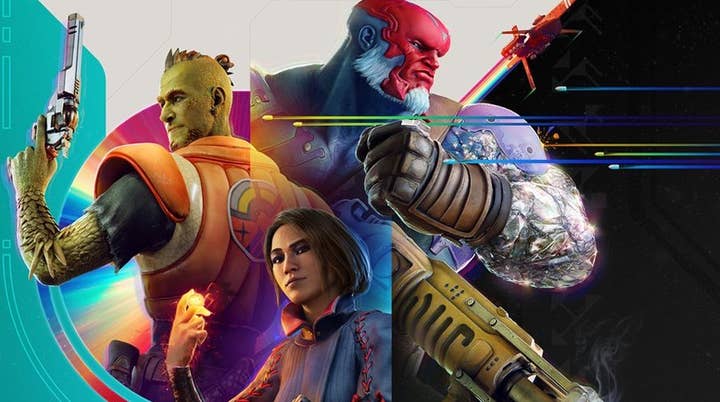PlayStation kicks off industry's Not-E3 season in muted style | Opinion
A focus on live games is likely to set the tone for other events over the next weeks – while a lack of major announcements for 2025 could leave a rare open goal for Xbox
The start of June in the games business feels increasingly like one of those archaeological sites where nothing remains of the original structure, but researchers can piece its shape together from the gaps it has left behind.
E3 is gone, but we are left with all the various events and showcases that grew up around the show through its various incarnations and endless identity crises – and so, for the next two weeks, we'll be treated to a trade show's worth of announcements and updates on upcoming games, just without the trade show that was once sat in the middle of it all.
Even without E3 itself, it remains arguably the best time of year to take the industry's temperature and to gain an understanding of where we're headed in the next 12 months.
This year, Sony kicked off the Not-E3 season with a State of Play presentation showcasing upcoming PS5, PSVR2, and PC games on the company's slate. It's fitting that Sony should go first, establishing the bar that others need to try to exceed; this year has cemented the PS5's market leadership in a big way, after all.
That doesn't mean Sony had nothing to prove, though. There's a sense of disquiet evident in a lot of the conversations and commentary around PlayStation this year.
After turning out a reliable stream of major hits for years, 2023 is a strangely fallow period for the company's release schedule, and while the unexpected breakout success of Helldivers 2 has given it a reprieve from accusations of an empty year, it hasn't helped alleviate suspicions that Sony's new fascination with live-service games has been to the detriment of its ability to focus on the high-quality single-player titles upon which it built its first-party reputation.
If you're in the camp that fears that Sony is outright pivoting to live service, the State of Play presentation this week will have done nothing to allay your concerns. Almost a third of the running time of the event was given over to Concord, a live-service PVP hero shooter developed by Firewalk Studios, a new team founded by Bungie veterans which Sony acquired last year.
The game looks fine – it may well be extremely good, and there's probably a place in the market right now for a competently-run and lightly-monetised game in the mould of Overwatch – but as the primary focus for a presentation in which Sony laid out its stall for the rest of this year and well into 2025, this will set alarm bells ringing for a lot of core consumers.
The thing to really watch out for is publishers announcing live-service sequels or spin-offs to formerly single-player series
Such concerns over Sony's focus in the coming years will not be allayed very much by three more live service type games being included in the presentation – Marvel Rivals (another hero shooter), Infinity Nikki (seemingly a gacha MMO title), and Ballad of Antara (clearly inspired by Elden Ring, but set to be an F2P title of some kind).
Whether you think such concerns are valid, of course, is entirely subjective; it is undeniable that the industry has ended up backed into an economic corner to some extent due to rising development costs and a stubbornly non-growing audience, with successful live service games being one of the seemingly few paths out of this dead end. The counterpoint is that "successful" is doing a lot of heavy lifting in that sentence, with the past couple of years seeing many high-profile live service titles collapsing soon after launch.
Even attaching expensively licensed IP doesn't guarantee any sort of return, as Square Enix and Warner Bros' misadventures with Marvel's Avengers and DC's Suicide Squad respectively have painfully demonstrated.
The immense risks attached to launching live service games, though, don't change the fact that the economics of big-budget single-player titles have never been worse – and few developers have been able to thread the needle of creating lower-budget titles that consumers still find appealing.
Sony's strong focus on live-service games is, therefore, likely to be replicated quite extensively in the various publisher and platform holder showcases we're due to see in the next fortnight. This trend isn't going to slow down despite recent failures in the space. Until someone comes up with a better solution to this economic conundrum, everyone is going to keep chasing those Fortnite dollars.
The thing to really watch out for is not so much attempts to introduce new live-service IP like Concord, but publishers announcing live-service sequels or spin-offs to formerly single-player (or traditional multiplayer) series.
That's where fur and feathers will really start to fly – in Sony's case, at least, there's a background understanding that while the company may be pivoting to live service in some regards, its major studios like Naughty Dog, Guerrilla, Insomniac, and Sucker Punch are all simply caught on the hop this year, with their undoubtedly immense AAA projects simply not quite ready to be shown in public.
Other publishers, however, are likely to go further than Sony, moving existing franchises and studios entirely over into live service, with all the attendant brand risks that entails.
Live service games were not, however, the only trend visible in Sony's State of Play. One interesting thing to note is that the company is continuing to work on building out partnerships with developers and publishers around Asia (outside Japan), with several of the games chosen for this showcase coming from Chinese developers in particular.
This is a strategy that has worked out quite well for Sony thus far – it gave the PlayStation console exclusivity for the Chinese-developed Genshin Impact, which is one of the most successful and profitable games of the past decade, and more recently saw Sony publishing Korean-developed Stellar Blade, which has done very well and (along with Helldivers 2) helped to rescue an otherwise quiet first half of the year for the PS5.
Broadening and deepening partnerships with companies in China and South Korea – which are not traditionally major regions for console development, but which have tons of talent and experience in mobile and PC gaming – is clearly a priority for Sony, and may give it an edge over competitors even at a time when its own internal first-party pipeline is stuttering a bit.
[Helldivers 2's success] hasn't helped alleviate suspicions that Sony's new fascination with live games has been to the detriment of its focus on the single-player titles upon which it built its first-party reputation
By contrast, Microsoft – whose Xbox showcase will come in a little over a week's time – has now absorbed the lion's share of $100bn worth of game studios and publishers, and will presumably be hoping to find its own competitive edge in the enormous studio system it now owns.
This has been repeated ad nauseum, but it remains true: Microsoft has a lot more to prove in its summer showcase events than its rival, not only due to lagging in console sales but also due to the very negative press generated by its recent studio closures and layoffs.
It needs to regain momentum, and to show that it is doing exciting things with the massive library of IP and network of studios it has acquired. While Sony's State of Play wasn't bad, per se, it didn't exactly set out a strong manifesto for PlayStation in the coming year – scanning responses online suggests that I'm far from alone in finding the utterly charming Astro Bot to be by far the most exciting thing in the presentation, but I don't think anyone is expecting that to be the next God of War or Spider-Man in mass-market appeal terms.

Microsoft could do a great deal to reset its recent negative narratives simply by showing a solid sequence of trailers for major franchises (or new IPs from major studios) with 2025 or even 2026 projected dates, giving Xbox an edge over PlayStation in consumer perception of the game pipeline for the first time in many years.
Overall, however, the relatively muted tone that Sony has set for the start of this odd, E3-less announcement season is likely to be more the rule than the exception. Just as high-profile live service failures have not deterred Sony, expect other publishers to charge ahead in this sector, some even more aggressively; and just as Sony's software pipeline appears to have hit some road bumps, expect to see other publishers also coming up a little empty in their announcements for 2025 and beyond.
You can't lay off as many people as the industry has in the past 18 months, coming off the back of the immense disruption of the pandemic era, and expect to keep pumping out high-budget hits. The events of the next couple of weeks may well be our first real glimpse at how much this loss of development capacity is going to inflict commercial pain in the next couple of years.

